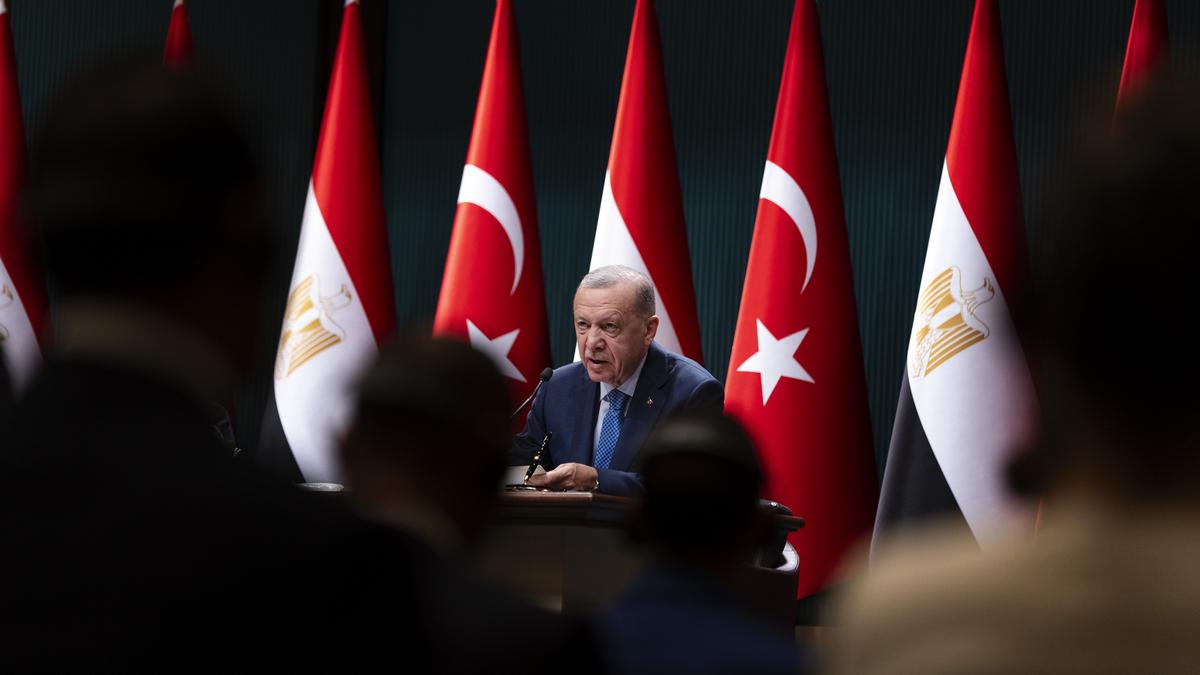Turkey’s President Tayyip Erdogan has called for an alliance of Islamic countries to counter what he perceives as the growing threat of Israeli expansionism. This call comes amidst heightened tensions between Turkey and Israel following the death of a Turkish-American woman during an anti-settlement protest in the Israeli-occupied West Bank. This incident, along with other recent events, has prompted Erdogan to renew his criticisms of Israel and push for a united front against its perceived aggression.
Erdogan’s Call for Islamic Alliance
Erdogan, known for his outspoken stance on Israel, argues that the formation of a unified Islamic bloc is the only solution to address what he terms Israeli “arrogance,” “banditry,” and “state terrorism.” His comments highlight a deep-rooted mistrust and animosity towards Israel that has characterized Turkey’s foreign policy under his leadership.
Historical Context and Ideological Differences
The call for an alliance is rooted in historical tensions between Turkey and Israel, dating back to the 1967 Arab-Israeli War and the 1973 Yom Kippur War. Turkey, a significant Muslim-majority nation, has traditionally supported the Palestinian cause and expressed concerns over Israel’s treatment of Palestinians. These ideological differences have further strained relations, particularly in recent years with Erdogan’s rising criticism of Israel.
Turkey’s Regional Policy
Erdogan asserts that Turkey’s recent diplomatic efforts to mend ties with Egypt and Syria are intended to build a “line of solidarity” against perceived Israeli expansionism. This implies that Turkey aims to create a regional coalition that would encompass not only Muslim-majority states but also countries like Egypt, Syria, and potentially Lebanon, all of which share common concerns over Israeli policies in the region. This strategy reflects Turkey’s broader foreign policy ambitions to assert itself as a regional power and regain influence after a period of estrangement from key players in the Middle East.
The Impact of the Gaza War
The recent war in Gaza, which has resulted in significant casualties and destruction, has further intensified tensions between Israel and Turkey. Erdogan has been a vocal critic of Israel’s actions during the conflict, accusing it of disproportionate violence and war crimes. His comments condemning Israel’s actions have gained traction in the Muslim world, fueling further anti-Israel sentiment and reinforcing the need for collective action.
The Palestinian Perspective
Turkey’s position is seen by many Palestinians as a sign of solidarity and a much-needed support. They view Erdogan’s stance as a counterpoint to the silence or, at times, the condemnation from some Arab countries towards the Israeli aggression. This has fueled the Palestinian hope that Turkey could become a key player in their fight for statehood and the resolution of the conflict.
The Role of the International Community
The ongoing conflict has also drawn attention to the international community’s role in resolving the Israeli-Palestinian conflict. Erdogan’s calls for unity resonate with concerns expressed by other nations about the lack of progress in finding a lasting solution. The conflict’s persistent instability poses challenges for regional security and has far-reaching consequences for the wider Middle East.
The Uncertain Future of Turkish-Israeli Relations
Erdogan’s comments suggest that any possibility of reconciliation between Turkey and Israel remains distant. His call for a unified Islamic front signals his commitment to confront what he perceives as Israel’s aggression. While Israel has not yet responded directly to Erdogan’s latest pronouncements, his remarks reflect the deep divisions and mistrust that have characterized the relationship for decades.
Potential Implications for Regional Stability
The situation carries significant implications for regional stability. The formation of a united Islamic front against Israel could potentially escalate tensions and fuel further conflict in the Middle East. The possibility of military confrontations or the expansion of proxy wars cannot be ruled out. On the other hand, the threat of a united front could also incentivize Israel to reassess its policies and engage in more diplomatic dialogue.
The Challenges Ahead
Erdogan’s ambition for an Islamic alliance against Israel faces significant challenges. Building such a coalition requires overcoming deep-rooted divisions within the Islamic world, from ideological differences to competing geopolitical interests. The ability to coordinate action and formulate a united response will prove a formidable test. However, the shared concerns over Israeli actions and the desire for a more peaceful Middle East may provide the necessary impetus for regional powers to come together.
Takeaways
Erdogan’s recent pronouncements highlight the complex dynamics of Turkish-Israeli relations and the ongoing Israeli-Palestinian conflict. His calls for an Islamic alliance against Israeli expansionism underscore a deep-rooted distrust of Israeli policies, driven by historical tensions, religious differences, and shared support for the Palestinian cause. The creation of such an alliance, while facing significant obstacles, may reshape the regional political landscape and have significant implications for stability in the Middle East.




